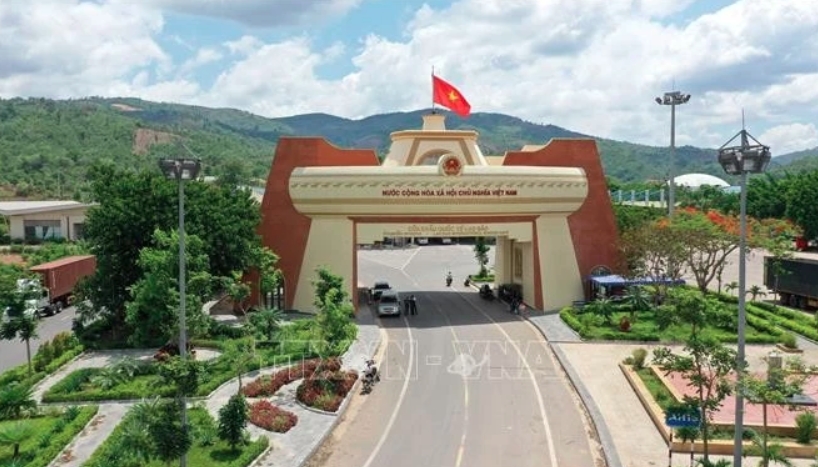Vietnam, Laos eye long-term, sustainable trade ties
Prime Minister Pham Minh Chinh’s working trip to visit Laos and co-chair the 47th meeting of the Vietnam-Laos Inter-Governmental Committee is expected to help create a breakthrough in the two countries’ economic, trade and investment cooperation.
Vietnam and Laos share a borderline of more than 2,300 km passing through the administrative boundaries of 10 provinces and cities of each side, which is an area with development potential and strategical location on the East-West Economic Corridor. There are nine international border gates, six main border gates, 18 auxiliary border gates, 27 crossings, and nine border-gate economic zones along the borderline.
Thriving trade relations
The two countries’ trade benefits from the reduction of tariff rates to 0% for most of their goods under the ASEAN Trade in Goods Agreement, the Vietnam-Laos Bilateral Trade Agreement, and the Vietnam-Laos Border Trade Agreement. Moreover, the Lao market does not set strict requirements for product quality, and most Lao consumers have a good assessment of Vietnamese products.
In addition, Laos almost accepts all standard certifications from exporting countries including Vietnam. Businesses can also take advantage of Laos' connections with Thailand and China to expand exports to these two countries.
At a recent meeting with Lao Ambassador to Vietnam Khamphao Ernthvanh, Minister of Industry and Trade Nguyen Hong Dien Dien highlighted the outstanding results in Vietnam-Laos trade relations in 2024, particularly bilateral trade turnover was estimated to reach US$2.2 billion, an increase of nearly 34% compared to 2023.
This is the first time the bilateral trade turnover has exceeded the US$2 billion mark, far surpassing the target set by the two governments, Dien said, noting that this achievement is a clear testament to the efforts of the governments, authorities, and businesses of both nations, including those made by the ministry and the embassy.
Regarding the Vietnam-Laos trade agreement, he emphasised that the Ministries of Industry and Trade of Vietnam and Laos have completed necessary procedures for the two governments to approve the new agreement that was signed on April 8, 2024 and are ready for implementation.
The minister called on the ambassador to assist in expediting necessary internal procedures with Lao authorities, and promptly inform Vietnam of the official date of effect so that the agreement can be implemented soon and the benefits it brings can be utilised as soon as possible.
Regarding cooperation in the energy and mineral sectors, Dien noted the key role of these two pillars in Vietnam-Laos economic relations. Cooperation in the purchase and sale of coal and electricity between Vietnam and Laos in 2024 has achieved very positive results.
The import of electricity and coal from Laos not only aims to meet Vietnam’s needs in socio-economic development but also helps to exploit Laos's potential, thereby contributing to its socio-economic development.
For her part, Khamphao shared the view with the minister regarding the impressive achievements that the two countries have attained in recent times. She expressed her impression of the growth of Vietnam's import-export turnover and industrial sector.
The goods of the two countries are not only competitive but complementary to each other. Currently, Vietnam exports to Laos chemicals, petroleum, machinery, equipment and tools, means of transport, iron and steel products; while importing rubber, coal, wood and wood products, fertilizers, ores and minerals from its neighbour.
According to the Lao Ministry of Planning and Investment, as of December 2024, there were 417 Vietnamese projects in Laos with a total approved value of more than US$4.9 billion. In particular, wholly Vietnamese-invested projects registered a total capital of US$4.6 billion; most of them in the fields of agricultural (US$680 million), electricity (US$980 million), and mineral exploitation (US$1 billion).
Notably, many investment projects of Vietnamese enterprises in Laos have operated effectively, contributing positively to local socio-economic development, creating jobs and raising incomes for thousands of workers, supplementing revenue sources for the Lao state budget, especially in the field of telecommunications, banking, rubber plantation and processing, and food production.
Further boosting trade cooperation
Deputy Director of the Import-Export Department of the Vietnamese Ministry of Industry and Trade Tran Quoc Toan acknowledged that trade between Vietnam and Laos still lags behind its potential, with various limitations remaining. To achieve a breakthrough in economic, trade, and investment cooperation, leaders of both countries have planned to strengthen economic connectivity and support, and develop a Laos-Vietnam industrial park.
Vietnamese Ambassador to Laos Nguyen Minh Tam emphasised that the establishment of such an industrial park would play a vital role in attracting investment, creating jobs, promoting exports, and modernising infrastructure. It would also foster the development of new urban areas in both countries.



